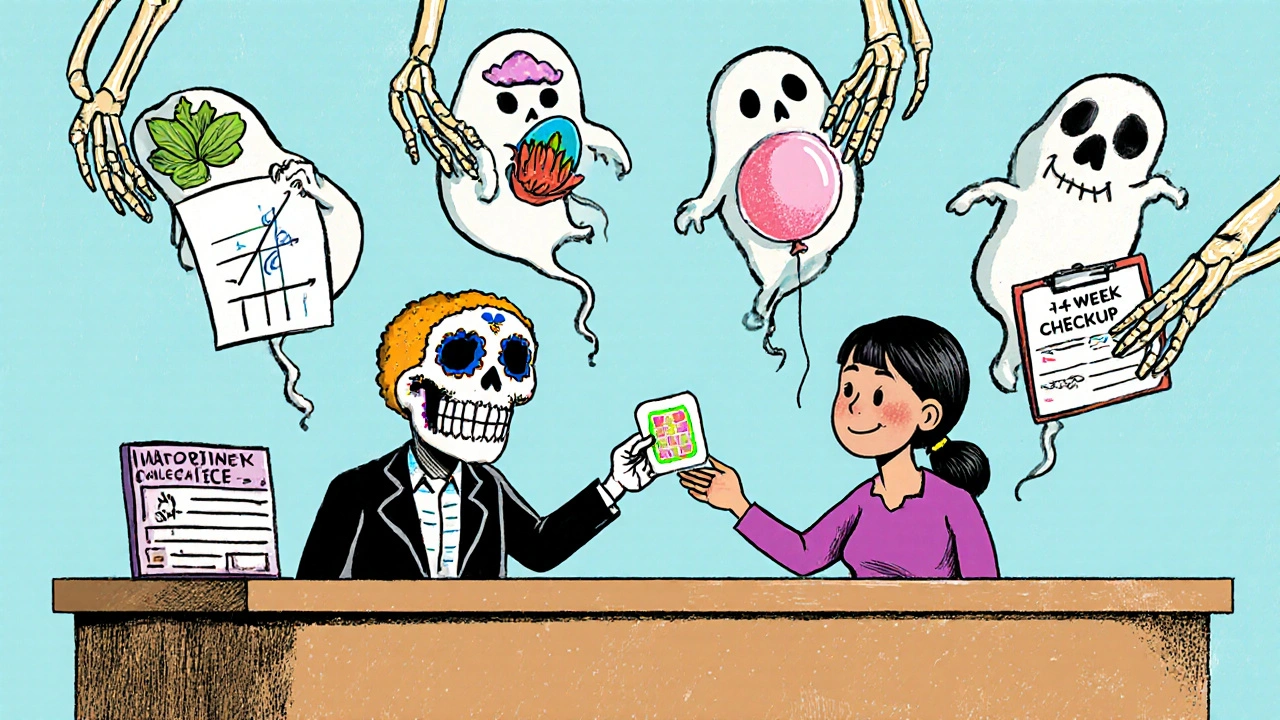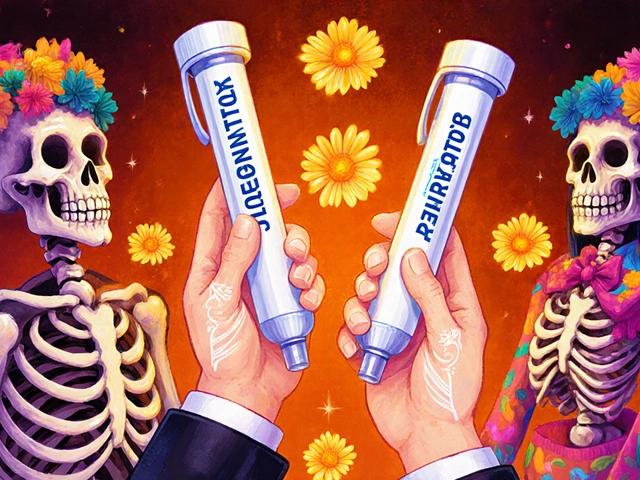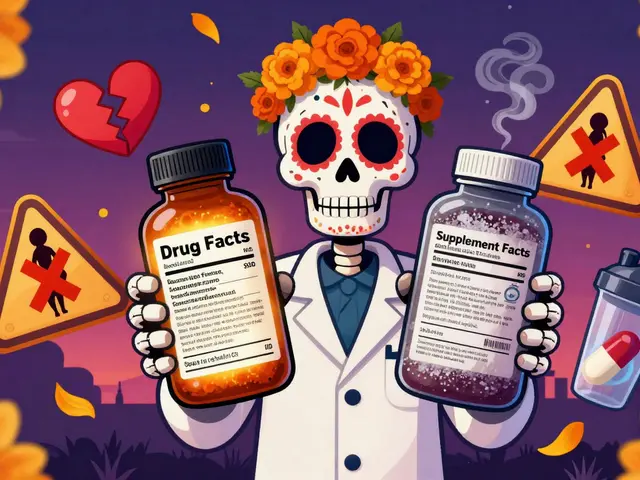
When someone starts gender-affirming hormone therapy (GAHT), they’re not just changing their body-they’re starting a long-term medical process that interacts with everything else in their health routine. Whether you’re on estradiol for feminizing therapy or testosterone for masculinizing therapy, those hormones don’t work in a vacuum. They’re processed by the same liver enzymes that handle dozens of other medications. And when those systems overlap, things can go sideways-sometimes quietly, sometimes dangerously.
How Hormones Meet Medications: The Metabolic Crossroads
Estradiol, the main hormone in feminizing therapy, is broken down mostly by an enzyme called CYP3A4. That’s the same enzyme that handles statins, some antibiotics, and even certain HIV drugs. If you’re taking something that blocks CYP3A4-like the HIV booster cobicistat-your estradiol levels can spike by 40% to 60% in just two weeks. That might sound good, but too much estrogen raises your risk of blood clots, stroke, and liver stress. On the flip side, if you’re on an enzyme-inducer like efavirenz (a common HIV medication), your estradiol levels can drop by half, making your hormone therapy less effective and potentially triggering a return of unwanted symptoms like facial hair or mood swings. Testosterone, used in masculinizing therapy, works differently. It’s converted by enzymes called 5-alpha reductase and aromatase. These aren’t the same as CYP3A4, so testosterone has fewer direct drug interactions. But that doesn’t mean it’s safe to ignore other meds. For example, if you’re taking blood thinners like warfarin, testosterone can make your blood clot more easily, which means your INR levels could drop without warning. That’s something your doctor needs to check every few months.HIV Medications and Hormones: A Delicate Balance
Transgender people are 3.4 times more likely to be living with HIV than cisgender people. That means many folks on GAHT are also on antiretroviral therapy (ART). The problem? Some HIV drugs mess with hormone levels in ways that aren’t obvious. Cobicistat-boosted regimens-like darunavir/cobicistat-are common because they’re effective and taken once a day. But they’re also strong CYP3A4 inhibitors. If you’re on this combo and taking oral estradiol, your estrogen levels might climb so high that you need to reduce your dose. Some clinics now recommend switching to transdermal patches instead, since they’re less affected by liver metabolism. On the other hand, efavirenz and other NNRTIs can slash estradiol levels. One study found that 8 out of 12 transgender women on efavirenz had hormone levels too low to maintain feminization. That’s not just about appearance-it’s about bone density, mood, and long-term health. The fix? Either switch HIV meds or bump up the estradiol dose under close monitoring. Good news: integrase inhibitors like dolutegravir don’t interfere with hormones. They’re now the first-line HIV treatment for transgender patients because they’re predictable and safe. And PrEP? The 2022 CROI study showed no meaningful interaction between tenofovir/emtricitabine (Truvada) and GAHT. Hormone levels stayed stable, and PrEP protection didn’t drop. That’s huge-it means you can take both without fear.
Psychiatric Meds: Hidden Risks and Silent Shifts
Transgender individuals are 2.5 times more likely to experience depression, anxiety, or suicidal ideation than cisgender people. So it’s common to be on antidepressants or mood stabilizers while on GAHT. But here’s the catch: many of these drugs change how your body handles hormones-and vice versa. Fluoxetine (Prozac) and other SSRIs can block CYP2D6, another enzyme involved in estrogen breakdown. That can lead to higher estradiol levels, even if you’re not changing your dose. It’s subtle, but over time, it can cause breast tenderness, weight gain, or mood swings you didn’t expect. Carbamazepine (Tegretol), used for seizures and bipolar disorder, is a strong CYP3A4 inducer. It can make estradiol less effective. One case report described a transgender woman who lost her breast development after starting carbamazepine-her estradiol levels dropped 45%. She had to increase her dose by 50% to regain stability. The reverse is also true. Testosterone can reduce the effectiveness of some antidepressants. In a 2023 review, 17 transgender men on SSRIs reported their depression returning within six weeks of starting testosterone. Their doctors didn’t adjust the antidepressant dose-until the patients got worse. The fix? Often, a 25% to 50% increase in SSRI dosage was needed. But here’s the scary part: only 3% of antidepressant trials include transgender people. So most of what we know comes from case reports, not large studies.What About Other Common Medications?
You might be surprised what else can interfere. Blood pressure meds? Some calcium channel blockers (like verapamil) can slightly raise estradiol levels. Thyroid meds? No direct interaction, but testosterone can increase your body’s need for thyroid hormone-so your TSH might creep up if you don’t get retested. Birth control pills? They’re not needed for transgender men on testosterone, but if you’re on estradiol and accidentally take a combined pill, you’re doubling up on estrogen. That’s risky. Same goes for herbal supplements. St. John’s Wort, a popular mood booster, is a CYP3A4 inducer-it can knock your estradiol levels down fast. Even over-the-counter painkillers matter. High-dose NSAIDs like ibuprofen (800 mg three times a day) can increase the risk of blood clots when combined with estrogen. That’s why many providers recommend sticking to acetaminophen instead.
What You Should Do Right Now
If you’re on GAHT and any other medication, here’s what actually works:- Make a full list of every pill, patch, injection, supplement, and herb you take. Include dosages and how often you take them.
- Bring it to every appointment-even if you think it’s unrelated. A vitamin D supplement might seem harmless, but if it’s combined with a calcium blocker, it could affect your hormone absorption.
- Ask for hormone level checks when starting or stopping any new drug. Estradiol and testosterone levels should be monitored within 4-6 weeks after any medication change.
- Know your HIV meds. If you’re on ART, ask your provider: “Is this drug a CYP3A4 inhibitor or inducer?” If they don’t know, ask for a pharmacist consultation.
- Don’t assume safety. Just because something worked for someone else doesn’t mean it’ll work for you. Your metabolism is unique.
The Bigger Picture: Why This Matters
This isn’t just about avoiding side effects. It’s about access. Too many transgender people delay or avoid GAHT because they’re scared of interactions. Others stop meds because they feel worse-not realizing it’s the combo, not the hormone. The good news? We’re getting better. In 2019, only 14% of U.S. endocrinology clinics had formal drug interaction screening. By 2023, that jumped to 41%. The NIH’s Tangerine Study is tracking 300 people on GAHT and psychiatric meds through 2025. And Gilead, the maker of Truvada, now requires transgender inclusion in all future PrEP trials. But the system still has gaps. Most electronic health records don’t flag hormone interactions. Many pharmacists aren’t trained on GAHT. And insurance often won’t cover hormone level tests unless you’re in crisis. You’re not alone in this. You’re part of a growing group of people who are demanding better care-and science is finally catching up.Can I take birth control pills while on gender-affirming hormones?
If you’re on feminizing therapy with estradiol, you don’t need birth control pills-they add extra estrogen and raise your risk of blood clots. If you’re on testosterone, birth control isn’t necessary for preventing pregnancy, but it won’t interfere with your hormone therapy. Still, most providers recommend skipping combined pills altogether to avoid unnecessary estrogen exposure.
Do antidepressants stop testosterone from working?
Antidepressants don’t stop testosterone from working physically, but testosterone can reduce the effectiveness of some antidepressants-especially SSRIs like sertraline or fluoxetine. Some transgender men report their depression returning after starting testosterone, even if their meds were working before. In those cases, increasing the antidepressant dose by 25-50% often helps.
Is it safe to take herbal supplements with GAHT?
Some herbal supplements can interfere with hormone metabolism. St. John’s Wort, for example, speeds up the breakdown of estradiol, which can make your therapy less effective. Other herbs like black cohosh or dong quai have estrogen-like effects and could add to your hormone load. Always tell your provider what supplements you’re taking-even if you think they’re “natural” and harmless.
How often should I get my hormone levels checked when starting a new medication?
Get your estradiol or testosterone levels checked 4 to 6 weeks after starting any new medication-especially HIV drugs, seizure meds, or antidepressants. That’s when changes in metabolism usually show up. After that, routine checks every 3 to 6 months are standard unless you’re making changes.
Can I switch from oral estradiol to a patch to avoid interactions?
Yes, switching from oral estradiol to a transdermal patch is one of the safest ways to reduce drug interactions. Patches deliver estrogen directly through the skin, bypassing the liver where most interactions happen. This makes them more stable when you’re on CYP3A4-affecting meds like HIV boosters. Many providers now recommend patches as the first choice for transgender women on complex medication regimens.




There are 9 Comments
Scarlett Walker
This is the kind of info I wish I had when I started HRT. I was on cobicistat and didn’t realize my estradiol was spiking until I got a blood clot scare. Switching to patches saved my life. Seriously, if you’re on HIV meds and GAHT, talk to a pharmacist. Not your GP-someone who actually knows how these enzymes play nice (or don’t).
Hrudananda Rath
One must lament the current state of medical discourse, wherein anecdotal case reports are elevated to the status of clinical guidelines. The very notion that trans individuals require bespoke pharmacological protocols-rather than being integrated into standard endocrinological frameworks-is, frankly, a testament to the fragmentation of evidence-based medicine in the age of identity politics.
Brian Bell
bro i was on efavirenz and my boobs started shrinking 😭 switched to dolutegravir and boom-back to normal. also st. john’s wort is a trap. don’t be that guy. 🙏
Nathan Hsu
Let me be clear: the metabolic interplay between CYP3A4, 5-alpha reductase, and aromatase is not trivial-nor is it intuitive. The fact that so many clinicians remain unaware of these dynamics is not merely negligent-it is dangerous. I have personally reviewed over two dozen case files where hormone levels were mismanaged due to ignorance of enzyme induction/inhibition pathways. This is not ‘hormone therapy’-it is pharmacokinetic navigation. And yet, patients are left to self-educate while their insurance denies lab tests. Where is the systemic accountability?
Ashley Durance
Let’s be honest-most people on GAHT don’t even know what CYP3A4 is. This article reads like a medical textbook, but the reality is, 80% of trans folks are taking random supplements from the internet, skipping labs, and blaming ‘stress’ when their mood crashes. This isn’t about drug interactions-it’s about patient responsibility. If you can’t track your meds, you shouldn’t be on HRT.
Scott Saleska
Hey, I just wanted to say-this is so important. I’m a trans guy on testosterone and started taking sertraline last year, and my depression came back hard. My doctor didn’t even think to adjust the dose until I brought up the article. I’m so glad someone’s talking about this. I think everyone should get a hormone panel when starting any new med-like, mandatory. I’ve been telling all my friends to do this. Seriously, it’s life-changing.
Ryan Anderson
Just wanted to add: if you're on a CYP3A4 inhibitor and taking oral estradiol, your liver is working overtime. Patches? Game-changer. I switched last year-no more nausea, no more weird mood swings. Also, don’t forget to check your TSH if you’re on testosterone. Mine crept up and no one caught it until I got dizzy at work. 🩺💡
Eleanora Keene
Okay I’m gonna be real-this post made me cry. I was so scared to start HRT because I’m on Lamictal for bipolar and I thought it would all just… blow up. But reading this? I finally feel like someone gets it. You’re not alone. And yes, get those labs done. I did. And now I’m thriving. You got this. 💪❤️
Joe Goodrow
Why are we giving special treatment to people who want to change their biology? This isn’t medicine-it’s ideology. We’re creating a system where normal drug interactions are treated like nuclear codes just because someone’s gender identity changed. Next thing you know, we’ll be rewriting pharmacology textbooks for vegans and left-handers too.
Write a comment
Your email address will not be published. Required fields are marked *